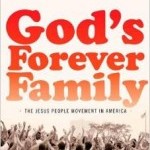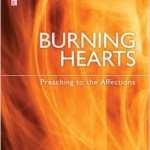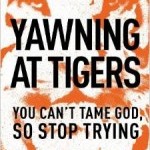I love to read. By God’s grace I am a pretty fast reader; I usually read a couple books each week. I find it helpful to summarize my thoughts on each book and I offer those thoughts in the hope that you will be encouraged to either read or pass over the given title.
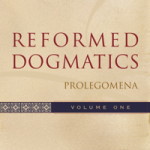 Reformed Dogmatics Vol. 1 by Herman Bavinck. One of my Endeavors for 2015 is to read through Bavinck’s Reformed Dogmatics. Volume 1 covers the matters of “Prolegomena,” which Bavinck breaks up into five parts: 1) Introduction to Dogmatics, 2) The History and Literature of Dogmatic Theology, 3) Foundations of Dogmatic Theology (Principia), 4) Revelation (Principium Externum), and 5) Faith (Principium Internum). The Dutch Doctor’s grasp of the relevant material is nothing short of astonishing. His immense, God-given ability in linguistics, history, theology, hermeneutics, and application shine through every section. I did get bogged down at various points, but that’s probably due to my having a more limited interest on some the volume’s subjects. The next volume is on “God and Creation” and I expect to be keenly engaged from start to finish.
Reformed Dogmatics Vol. 1 by Herman Bavinck. One of my Endeavors for 2015 is to read through Bavinck’s Reformed Dogmatics. Volume 1 covers the matters of “Prolegomena,” which Bavinck breaks up into five parts: 1) Introduction to Dogmatics, 2) The History and Literature of Dogmatic Theology, 3) Foundations of Dogmatic Theology (Principia), 4) Revelation (Principium Externum), and 5) Faith (Principium Internum). The Dutch Doctor’s grasp of the relevant material is nothing short of astonishing. His immense, God-given ability in linguistics, history, theology, hermeneutics, and application shine through every section. I did get bogged down at various points, but that’s probably due to my having a more limited interest on some the volume’s subjects. The next volume is on “God and Creation” and I expect to be keenly engaged from start to finish.
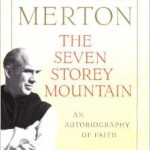 The Seven Storey Mountain: An Autobiography of Faith by Thomas Merton. For years I heard about The Seven Storey Mountain, but only now got around to reading it, and only because it’s required for a June seminar on “20th Century Spirituality.” Many have called it the best autobiography of faith since Augustine’s Confessions. Such sentiment is surely overstatement, yet one can’t deny the smashing worldwide influence Merton (d. 1915-1968) has had over the last seventy years or so. The power of Merton’s story doesn’t lie in its uniqueness—he was one of many who converted to Catholicism in search of peace and meaning. No, the force of Merton lies in his literary skill in relating to the common man. His autobiography is beautifully, hilariously, and masterfully written. I can’t remember the last book I read in which author’s skill in writing so consistently amazed me.
The Seven Storey Mountain: An Autobiography of Faith by Thomas Merton. For years I heard about The Seven Storey Mountain, but only now got around to reading it, and only because it’s required for a June seminar on “20th Century Spirituality.” Many have called it the best autobiography of faith since Augustine’s Confessions. Such sentiment is surely overstatement, yet one can’t deny the smashing worldwide influence Merton (d. 1915-1968) has had over the last seventy years or so. The power of Merton’s story doesn’t lie in its uniqueness—he was one of many who converted to Catholicism in search of peace and meaning. No, the force of Merton lies in his literary skill in relating to the common man. His autobiography is beautifully, hilariously, and masterfully written. I can’t remember the last book I read in which author’s skill in writing so consistently amazed me.
Anyone who knows me well knows I’m sympathetic to many aims of the monastic life. I love the solitude, simplicity, devotion, and earnest pursuit of God. So maybe I am unusually inclined to enjoy Merton’s autobiography—not for his conversion to Catholic faith and doctrine, but for his single-minded devotion in service to God.
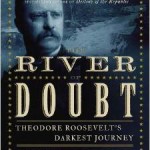 The River of Doubt: Theodore Roosevelt’s Darkest Journey by Candice Millard. I loved Candice Millard’s account of President James Garfield’s assassination in Destiny of the Republic. In that book she compellingly and insightfully retells famous stories of days gone by. Although her book on Roosevelt is not as strong as the one on Garfield, The River of Doubt is still is outstanding. After TR lost out on a third bid for the presidency he turned to explore one of the last unknown areas of the globe: the Amazon. In particular, a yet-to-be traveled body of water known as the River of Doubt. “Indians armed with poison-tipped arrows haunted its shadows; piranhas glided through its waters; boulder-strewn rapids turned the river into a roiling cauldron.” And there TR nearly died. What a story! I can’t wait for Millard’s next book, on Churchill and the Boer War.
The River of Doubt: Theodore Roosevelt’s Darkest Journey by Candice Millard. I loved Candice Millard’s account of President James Garfield’s assassination in Destiny of the Republic. In that book she compellingly and insightfully retells famous stories of days gone by. Although her book on Roosevelt is not as strong as the one on Garfield, The River of Doubt is still is outstanding. After TR lost out on a third bid for the presidency he turned to explore one of the last unknown areas of the globe: the Amazon. In particular, a yet-to-be traveled body of water known as the River of Doubt. “Indians armed with poison-tipped arrows haunted its shadows; piranhas glided through its waters; boulder-strewn rapids turned the river into a roiling cauldron.” And there TR nearly died. What a story! I can’t wait for Millard’s next book, on Churchill and the Boer War.
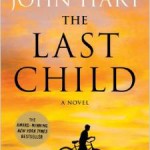 The Last Child by John Hart. Whenever I’m at a loss for what fiction book to read next I tend to gravitate towards Edgar Award winners. And so it was that John Hart’s The Last Child, winner of the 2010 Edgar for Best Novel, recently came into my home. Hart tells his tale is with profound earthiness and emotion. Johnny Merrimon, the titular last child, is a thirteen-year-old boy in search of his sister who went missing over a year ago. His investigation is full of hope, agony, and tension to boot. The publisher’s summary says, “Traveling the wilderness between innocence and hard wisdom, between hopelessness and faith, The Last Child leaves all categories behind and establishes John Hart as a writer of unique power.” I totally agree.
The Last Child by John Hart. Whenever I’m at a loss for what fiction book to read next I tend to gravitate towards Edgar Award winners. And so it was that John Hart’s The Last Child, winner of the 2010 Edgar for Best Novel, recently came into my home. Hart tells his tale is with profound earthiness and emotion. Johnny Merrimon, the titular last child, is a thirteen-year-old boy in search of his sister who went missing over a year ago. His investigation is full of hope, agony, and tension to boot. The publisher’s summary says, “Traveling the wilderness between innocence and hard wisdom, between hopelessness and faith, The Last Child leaves all categories behind and establishes John Hart as a writer of unique power.” I totally agree.
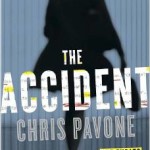 The Accident by Chris Pavone. The Edgars are also responsible for my recent foray into the C.V. of Chris Pavone as his debut novel The Expats won the 2013 Edgar for Best Novel. I enjoyed his first offering enough to check out his second book and The Accident is no sophomore slump. The plot centers on an anonymous book manuscript that has the power to bring down some of the most powerful men in the world. The action develops quickly and spans the globe as some are interested in profiting off the book, while others will—literally and prosaically—stop at nothing to burn all evidence of the manuscript’s existence. I was freshly surprised at several different points, but the novel’s ending unfortunately doesn’t live up to the great tension Pavone succeeds in building. And what do they say about a book’s ending? It’s the first thing you remember. Maybe that’s why, a few weeks on since finishing The Accident, I think of it as something of a disappointment.
The Accident by Chris Pavone. The Edgars are also responsible for my recent foray into the C.V. of Chris Pavone as his debut novel The Expats won the 2013 Edgar for Best Novel. I enjoyed his first offering enough to check out his second book and The Accident is no sophomore slump. The plot centers on an anonymous book manuscript that has the power to bring down some of the most powerful men in the world. The action develops quickly and spans the globe as some are interested in profiting off the book, while others will—literally and prosaically—stop at nothing to burn all evidence of the manuscript’s existence. I was freshly surprised at several different points, but the novel’s ending unfortunately doesn’t live up to the great tension Pavone succeeds in building. And what do they say about a book’s ending? It’s the first thing you remember. Maybe that’s why, a few weeks on since finishing The Accident, I think of it as something of a disappointment.
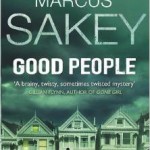 Good People by Marcus Sakey. My love for Sakey’s “Brilliance Saga” is admittedly rapturous. Only “The Lord of the Rings” and “Harry Potter” interest me more. Since reading the first two Brilliance installments around the turn of the new year I’ve slowly been working my way through Sakey’s older novels. While they aren’t nearly as captivating as the Brilliance books, they are page turners nonetheless. Good People revolves around Tom and Anna Reed, who are confronted with an expected predicament. Upon finding their downstairs tenant dead they also discover $370,000 in cash laying around the kitchen. Will they take it or report it? They take it . . . and madness, of the hard-to-believe kind, ensues.
Good People by Marcus Sakey. My love for Sakey’s “Brilliance Saga” is admittedly rapturous. Only “The Lord of the Rings” and “Harry Potter” interest me more. Since reading the first two Brilliance installments around the turn of the new year I’ve slowly been working my way through Sakey’s older novels. While they aren’t nearly as captivating as the Brilliance books, they are page turners nonetheless. Good People revolves around Tom and Anna Reed, who are confronted with an expected predicament. Upon finding their downstairs tenant dead they also discover $370,000 in cash laying around the kitchen. Will they take it or report it? They take it . . . and madness, of the hard-to-believe kind, ensues.
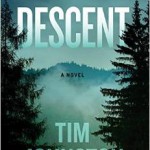 The Descent by Tim Johnston. The press clippings sucked me in and probably created unrealistic expectations for Johnston’s debut novel. The Washington Post says, “The story unfolds brilliantly, always surprisingly . . . Read this astonishing novel.” Vanity Fair exclaims, “Tim Johnston’s high-wire literary thriller . . . will leave you gasping.” If you’ve yet to hear of the genre, a “literary thriller” is a somewhat snarky label for thrillers written in creative, supposedly artistic prose. The Descent is full of surprises and occasional moments of splendor. On the whole, however, I found Johnston’s artistry will frustrating and obstructive.
The Descent by Tim Johnston. The press clippings sucked me in and probably created unrealistic expectations for Johnston’s debut novel. The Washington Post says, “The story unfolds brilliantly, always surprisingly . . . Read this astonishing novel.” Vanity Fair exclaims, “Tim Johnston’s high-wire literary thriller . . . will leave you gasping.” If you’ve yet to hear of the genre, a “literary thriller” is a somewhat snarky label for thrillers written in creative, supposedly artistic prose. The Descent is full of surprises and occasional moments of splendor. On the whole, however, I found Johnston’s artistry will frustrating and obstructive.
Click here to find other entries in the Recent Reads series.


